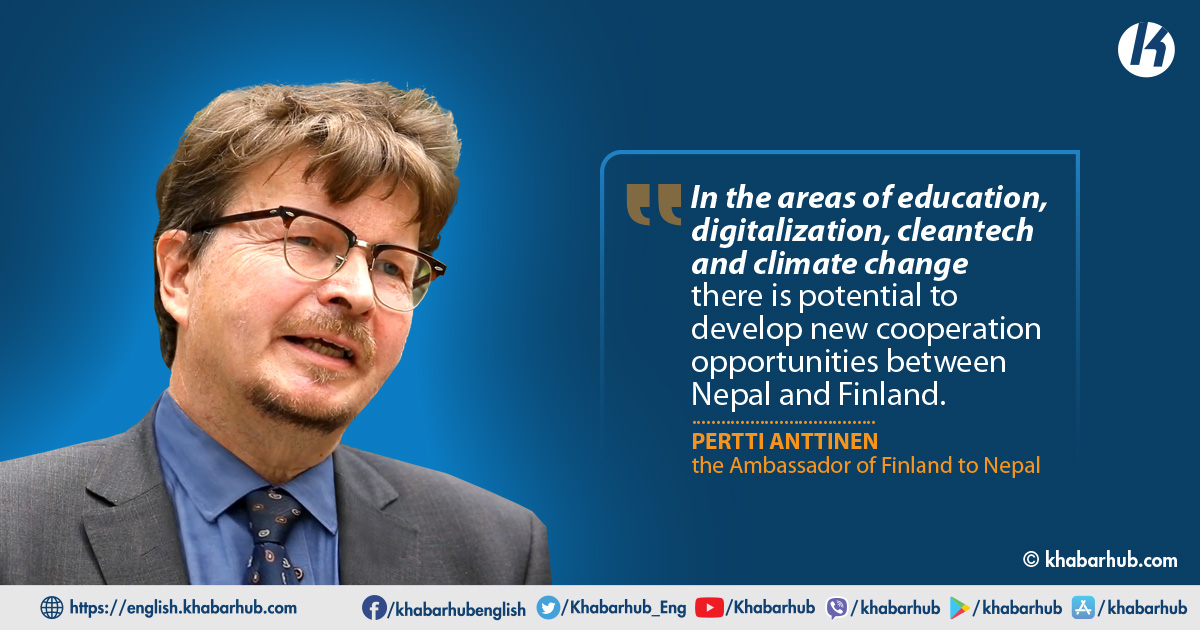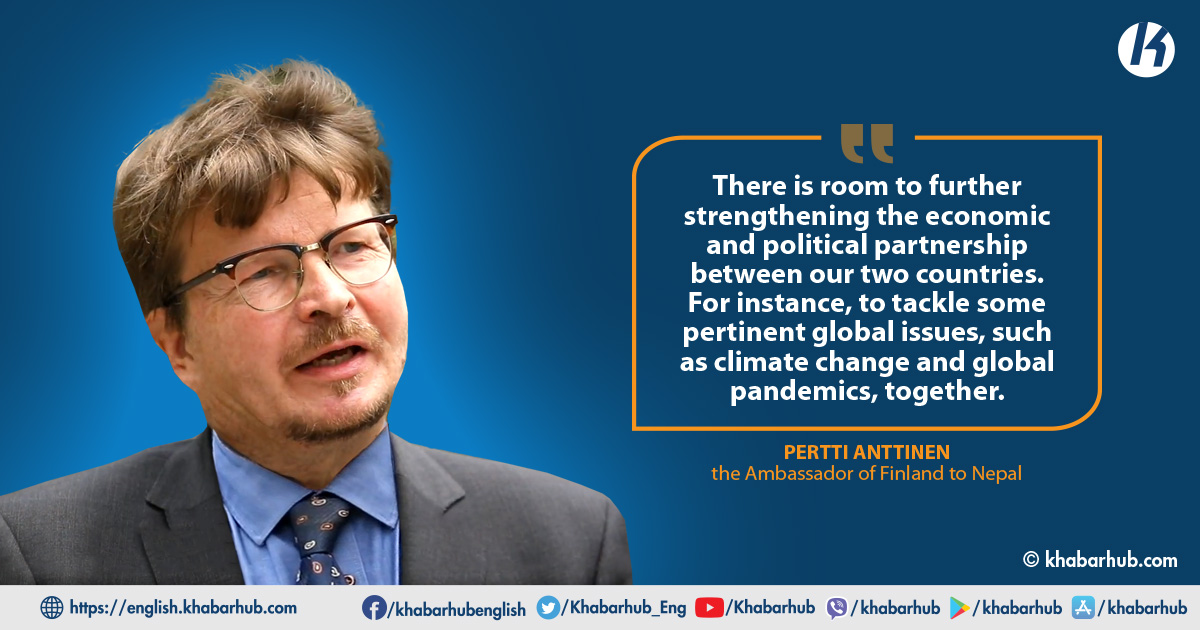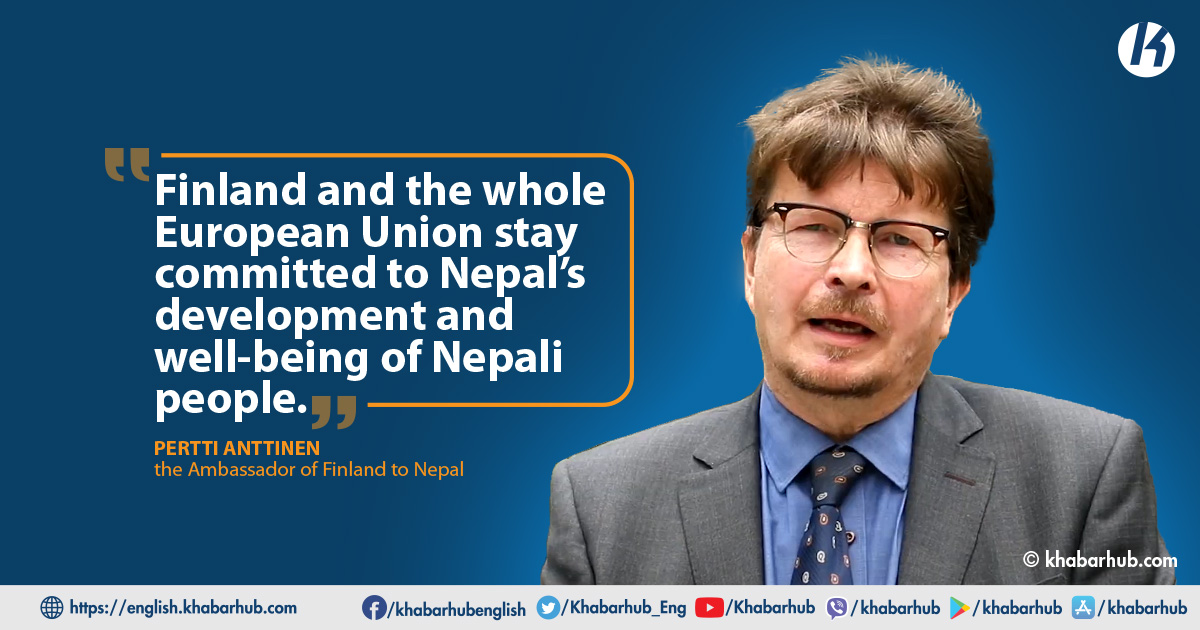0%

Pertti Anttinen, the Ambassador of Finland to Nepal, assures that Finland and the European Union stay committed to Nepal’s development and well-being of Nepali people. Finland has already supported Nepal with 30 000 kg of COVID-19 related materials and supplies as part of the EU Civil Protection Mechanism.
The two countries established diplomatic relations in 1974, and the bilateral relations between them have been marked by cordiality, friendship, and cooperation.
Finland has also repurposed/redirected part of its ongoing projects funding/activities in WASH, education and gender to address the challenges caused by the pandemic. Ishwar Dev Khanal of Khabarhub talked to Ambassador Anttinen on a various range of issues. Excerpts:
Finland and the whole European Union stay committed to Nepal’s development and well-being of Nepali people.
Would you please give us the figure of Finland’s support to Nepal for the COVID-19 pandemic response?
Unfortunately, I cannot give an exact figure of Finland’s total support for Nepal to fight against Covid 19 pandemic.
However, we have repurposed/redirected part of our ongoing projects funding/activities in WASH, education and gender to address the challenges caused by the pandemic.
Similarly, the Finnish-funded NGOs (17) have done the same. Furthermore, an additional 2,14 million euros has been given to the GoN SSDP program in the education sector to assist schools to cope with the pandemic in 2020-21.
What type of assistance has Finland and the EU jointly provided to Nepal in fighting the Covid-19 epidemic?
One full cargo plane, that is, 30 000 kg) of COVID-19 related materials and commodities were delivered from Finland to Nepal in May as part of the EU Civil Protection Mechanism.

What other cooperation will be provided further in this joint effort to combat the pandemic?
On the global level, Finland provides funding to UN agencies and International Financing Agencies such as World Bank and ADB as well as to the COVAX vaccine program. So, we are talking of millions of euros of COVID-19 help from Finland to Nepal.
How do you see the response of the international community in the recent spread of the second wave of deadly COVID-19 pandemic in Nepal?
I think it has been strong, timely and robust as we have been able to reply to Nepal’s request for help swiftly.
But even more important is that the Government of Nepal continues its effort to fight against the deadly corona pandemic using domestic resources effectively for commodities and vaccines.
What are the post-COVID future prospects of Nepal-Finland cooperation and relations? How can both countries develop a long-term partnership?
Finland and the whole European Union stay committed to Nepal’s development and well-being of Nepali people.
Finland’s new country strategy and program 2021-24 for Nepal was recently approved by our Minister for Development policy and Trade, Ville Skinnari. The focus will remain on WASH, education and gender.
The budget will be 54 million euros for that period complemented by other financing instruments such as CSO support and private sector cooperation instruments.
What was your experience in Nepal in terms of opportunity, prospects and challenges? In what areas can the Nepal-Finland bilateral relationship be enhanced? How can both countries work together to set the priorities in the post-COVID-19 situation?
There is room to further strengthening the economic and political partnership between our two countries. For instance, to tackle some pertinent global issues, such as climate change and global pandemics, together. And, hopefully, increase trade and economic cooperation between Finland and Nepal.
In which areas can civil society, NGOs, the private sector and other Finnish organizations cooperate with Nepal?
Finnish civil society organizations cooperate with their local CSO partners in Nepal related to various topics.
For example, the cooperation projects address empowerment of women, income-generating activities, and strengthening community resilience through sustainable livelihoods, different types of skills trainings, decent work, rights of children, rights of persons with disabilities, education, community-based disaster risk reduction, natural resources management and climate change adaptation.
There is very long and close cooperation between the Finnish and Nepali CSOs. The key in all cooperation is to work at the local level and reach the people in vulnerable positions.

Regarding the cooperation between the private sector institutions in Finland and Nepal, we would like to see more new initiatives emerging in the future.
Perhaps, in the areas of education, digitalization, cleantech and climate change there is potential to develop new cooperation opportunities between Nepal and Finland.
However, this requires a good enabling environment for businesses to cooperate and invest. Finland and Nepal have also a close relationship in terms of having many Nepali students studying in Finland.
Are there any opportunities for collaboration in the higher education and skill-based areas in the post-COVID-19 situation?
There are plenty of cooperation opportunities in the post-Covid 19 era. One of the main current challenges of school education in Nepal is teacher preparation.
This includes various elements such as making curriculum and reading materials relevant and contextual, and making teacher development and preparation effective.
It also comprises enhancing the relevance, quality, and efficiency of school education by improving teacher management, teaching and learning and teacher evaluation, and expanding and strengthening teacher training centers at the local government level.
These are some key direct drivers to improve the overall quality of education, including improved learning outcomes of the children.
These are also some areas, which Finland has been supporting strongly over the years.
Furthermore, an increasing number of Nepali students commence their studies in Finland annually.